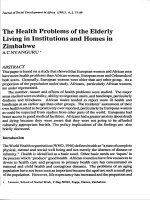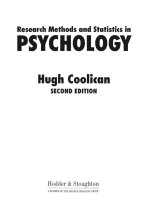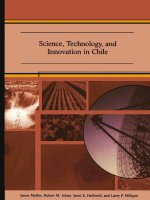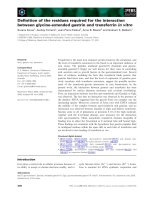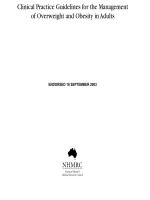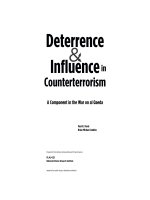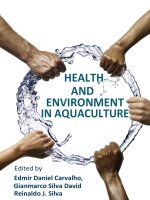PROFESSIONALISM AND ETHICS IN TEACHING ppt
Bạn đang xem bản rút gọn của tài liệu. Xem và tải ngay bản đầy đủ của tài liệu tại đây (1.67 MB, 283 trang )
PROFESSIONALISM AND ETHICS IN
TEACHING
Professionalism and Ethics in Teaching
examines the ethical issues in
teaching. After discussing the moral implications of professionalism,
the author explores the relationship of education theory to teaching
practice and the impact of this relationship on professional expertise.
He then identifies and examines some central ethical and moral
issues in education and teaching. Finally, David Carr gives a detailed
analysis of a range of issues concerning the role of the teacher and the
management of educational institutions.
Professionalism and Ethics in Teaching
presents a thought-
provoking and stimulating study of the moral dimensions of the
teaching profession.
David Carr is Professor of Philosophy of Education in the Faculty of
Education at the University of Edinburgh. He is the author of
Educating the Virtues
(1991) and editor of
Education, Knowledge
and
Truth
(1998).
PROFESSIONAL ETHICS
Editor: Ruth Chadwick
Centre for Professional Ethics, University of
Central Lancashire
Professionalism is a subject of interest to academics, the general
public and would-be professional groups. Traditional ideas of
professions and professional conduct have been challenged by recent
social, political and technological changes. One result has been the
development for almost every profession of an ethical code of conduct
which attempts to formalise its values and standards. These codes of
conduct raise a number of questions about the status of a ‘profession’
and the consequent moral implications for behaviour.
This series seeks to examine these questions both critically and
constructively. Individual volumes will consider issues relevant to
particular professions, including nursing, genetic counselling,
journalism, business, the food industry and law. Other volumes will
address issues relevant to all professional groups such as the function
and value of a code of ethics and the demands of confidentiality.
Also available in this series
:
ETHICAL ISSUES IN
JOURNALISM AND THE
MEDIA
Edited by Andrew Belsey and
Ruth
Chadwick
GENETIC COUNSELLING
Edited by Angus Clarke
ETHICAL ISSUES IN NURSING
Edited by Geoffrey Hunt
THE GROUND OF
PROFESSIONAL ETHICS
Daryl Koehn
ETHICAL ISSUES IN SOCIAL
WORK
Edited by Richard Hugman and
David Smith
ETHICS AND COMMUNITY IN
THE HEALTH CARE
PROFESSIONS
Edited by Michael Parker
FOOD ETHICS
Edited by Ben Mepham
CURRENT ISSUES IN
BUSINESS ETHICS
Edited by Peter W.F.Davies
THE ETHICS OF BANKRUPTCY
Jukka Kilpi
ETHICAL ISSUES IN
ACCOUNTING
Edited by Catherine Gowthorpe
and John
Blake
ETHICS AND VALUES IN
HEALTH CARE MANAGEMENT
Edited by Souzy Dracopoulou
ii
PROFESSIONALISM
AND ETHICS IN
TEACHING
David Carr
London and New York
First published 2000
by Routledge
11 New Fetter Lane, London EC4P 4EE
Simultaneously published in the USA and Canada
by Routledge
29 West 35th Street, New York, NY 10001
Routledge is an imprint of the Taylor & Francis Group
This edition published in the Taylor & Francis e-Library, 2005.
“To purchase your own copy of this or any of Taylor & Francis or Routledge’s
collection of thousands of eBooks please go to www.eBookstore.tandf.co.uk.”
© 2000 David Carr
The right of David Carr to be identified as the author of this work has
been asserted by him in accordance with the Copyright, Designs and
Patents Act 1988
All rights reserved. No part of this book may be reprinted or
reproduced or utilised in any form or by any electronic, mechanical,
or other means, now known or hereafter invented, including
photocopying and recording, or in any information storage or
retrieval system, without permission in writing from the publishers.
British Library Cataloguing in Publication Data
A catalogue record for this book is available from the British Library
Library of Congress Cataloging in Publication Data
A catalogue record has been requested for this title
ISBN 0-203-97939-7 Master e-book ISBN
ISBN 0-415-18459-2 (hbk)
ISBN 0-415-18460-6 (pbk)
CONTENTS
Series editor’s preface
vii
Preface
viii
Acknowledgements
xii
PART I Education, teaching and professionalism 1
1 Teaching and education 3
2 Professions, professionalism and professional
ethics
21
3 Teaching and professionalism 39
PART II Educational theory and professional practice 57
4 Educational theory misapplied? 59
5 Different faces of educational theory 75
6 Teaching and competence 91
PART III Professional values and ethical objectivity 109
7 Professional values and the objectivity of value 111
8 Rival conceptions of education 129
PART IV Ethics and education, morality and the teacher 147
9 Educational rights and professional wrongs 149
10 Aims of education, schooling and teaching 165
11 The moral role of the teacher 183
PART V Particular issues 201
12 Ethical issues concerning the role of the teacher 203
13 Ethical issues concerning education and schooling 221
Notes
239
Bibliography
257
Index
265
vi
SERIES EDITOR’S PREFACE
Professional ethics is now acknowledged as a field of study in its own
right. Much of its recent development has resulted from rethinking
traditional medical ethics in the light of new moral problems arising
out of advances in medical science and technology. Applied
philosophers, ethicists and lawyers have devoted considerable energy
to exploring the dilemmas emerging from modern health-care
practices and their effect on the practitioner-patient relationship.
Beyond health care, other groups have begun to think critically
about the kind of service they offer and about the nature of the
relationship between provider and recipient. In many areas of life,
social, political and technological changes have challenged both
traditional ideas of practice and underlying conceptions of what
professions are. Competing trends towards ‘professionalisation’ on the
one hand (via, for example, the proliferation of codes of ethics, or of
professional conduct), and towards challenging the power of the
traditional ‘liberal professions’ on the other, have required exploration
of the concepts of ‘profession’ and ‘professional’.
The author of this volume argues a case for viewing the professions
as moral projects; and teaching and education as genuine professions.
He takes issue with views of teaching as simply competence based and
of the teacher as technician. In the face of modern sceptical positions
he explores the moral role of the teacher and the goals of teaching.
The Professional Ethics book series seeks to examine ethical issues
in the professions and related areas both critically and constructively.
Individual volumes address issues relevant to all professional groups,
such as the nature of a profession and the function and value of codes
of ethics. Other volumes examine issues relevant to particular
professions, including those which have hitherto received little
attention, such as social work, the insurance industry and
accountancy. This volume makes a contribution to both aims of the
series: the view of teaching presented here addresses both
philosophical issues about how professions should be regarded and
specific issues in contemporary debates about teaching.
PREFACE
This volume represents an attempt, to the best of my ability, to draw
together a decade of enquiries into the meaning of professionalism,
the relationship of educational theory and practice and the nature of
moral enquiry into a reasonably coherent whole. Although all these
topics have interested me throughout my professional educational life,
the path to this book can be traced back to an attempt in the summer
of 1990 to assemble a full-length exploration of the moral basis of
teaching and educational practice. This attempt was motivated mainly
by a certain antipathy to prevailing tendencies, at least in some
quarters, to technicist approaches to education, and by a concern to
demonstrate the wider value implicatedness of education and
teaching; in this respect, although this work is addressed to a rather
wider set of educational, cultural and epistemological concerns, these
original preoccupations should still be apparent in the present volume.
In the event, however, the earlier enterprise proved premature and
was abandoned following the completion of seven or eight draft
chapters.
However, material from this earlier venture did survive in the form
of two presently pertinent papers which were eventually published in
late 1992. The first was published under the title ‘Four dimensions of
educational professionalism’ in
Westminster Studies
in Education;
the
second appeared as ‘Practical enquiry, values and the problem of
educational theory’ in
Oxford Review of Education,
and was later
reprinted in W.Hare and J.Portelli (eds),
Philosophy
of Education
(Detselig, 1996). Neither of these papers—with the exception of a
paragraph or so from the second one—survives in original form here,
but both were directly ancestral to the first two sections of this book.
The first paper on educational professionalism was published at about
the same time, more by coincidence than by design, as I found myself
charged with co-ordinating and teaching two courses focused on
professional issues—a cross-institutional module on professional
values and a modular Master’s course on professional knowledge and
practice—in my employing institution. Over the years, these courses—
as well as numerous invitations to present papers on various aspects
of professional development to a variety of occupational groups—
afforded unprecedented opportunities to explore issues raised in
particularly the first two sections of this volume. In this respect, the
Westminster
Studies
paper is a not too remote forerunner of many of
the ideas discussed in Part 1—as well as of a recent
Journal of
Applied
Philosophy
(1999) paper entitled ‘Professional education and
professional ethics’, upon which Chapter 2 is based.
However, it seems that the second paper for
Oxford Review
provided
an even more powerful springboard for further work throughout the
1990s on a variety of issues relating to the vexed educational problem
of the relationship of theory to practice. Moreover, despite having
written over the years on most topics of educational philosophy and
theory, if I was asked to choose
one
paper which I would regard as
having made a substantial contribution to the field as a whole, the
1995
Journal of Philosophy of
Education
paper, ‘Is understanding the
professional knowledge of teachers a theory-practice problem?’—upon
which Chapters 4 and 5 are based—would have to be a strong
contender. Notwithstanding that, so far as I can see, this paper has
had next to no influence in the extensive literature of educational
philosophy and theory (perhaps the less than prepossessing title did
not help); where it has been noticed it has been seriously
misunderstood, although it has more than likely been overshadowed
by papers on the same theme by names more famous than mine, it
still seems to me that it goes rather further in terms of basic analysis
of this difficult problem than many if not most of its contemporaries.
Be that as it may, as well as having clear ancestry in the earlier
Oxford Review
piece, this paper is also strongly related to critiques of
the competency conception of teacher education and training which I
mounted around the same time in several other places. Chapter 6,
indeed, is effectively a revised version of a paper entitled ‘Questions of
competence’, published in the
British Journal of Educational Studies
in 1993.
In brief, whereas Part 1 of this book is concerned to demonstrate the
inherently ethical character of any distinctive occupational category of
profession—to show that the standard professions are in a significant
sense moral projects—and to defend the claim that teaching and
education are genuine professions in this sense, Part 2 is concerned to
show that the knowledge and expertise of teachers is essentially
grounded in the kind of practical deliberation which Aristotle
distinguished as
phronesis
or moral wisdom from
techne
or productive
reasoning (though it is not denied that teachers and other
professionals need both). Part 3, therefore, turns to the important task
of defending—in the teeth of various kinds of contemporary
ix
subjectivist and relativist moral scepticism—the basic
objectivity
of
moral reason and judgement. To this end, Chapter 7 develops themes
which I have explored over the years in such educational
philosophical papers as ‘Education and values’
(British Journal of
Educational Studies,
1991), as well as in ‘Moral education and the
objectivity of values’—my own contribution to a collection entitled
Education, Knowledge and Truth: Beyond the
PostModern Impasse,
which I recently (1998) edited for Routledge. In exploring the
relativist connotations of a ‘rival traditions’ conception of educational
thought with reference to the time-honoured educational theoretical
dichotomy of traditionalism and progressivism, Chapter 8 also returns
to a topic which has interested me at least from ‘On understanding
educational theory’ published in
Educational Philosophy and Theory
(1985), to a more recent (1998) essay, ‘Traditionalism and
progressivism: a perennial problematic of educational theory and
policy’ in
Westminster
Studies in Education
.
The main concern of Part 4 is to explore the ethical complexities of
any serious reflection upon the aims and purposes of education, as
well as to distinguish some of the key respects in which teaching is
implicated in moral issues and concerns of human well-being and
harm. To this end, Chapter 9 first distinguishes between the rather
different levels of normativity at which teachers or teaching might be
found derelict or wanting, before proceeding to explore the ethical
grounds for regarding certain particular forms of institutional conduct
or personal relationship as professionally suspect or inadmissible in
educational contexts. Chapter 10 turns to the not inconsiderable
problem of identifying positive goals for education—again in the face
of influential postmodern scepticism about the very intelligibility of
that knowledge-based notion of rational emancipation which was for
post-war philosophical pioneers of liberal education the very
cornerstone of educational endeavour. It is argued that it is crucial to
the clarification of many contemporary confusions about educational
aims that we observe a distinction between education and schooling.
(This argument was more fully explored in my essay ‘The dichotomy
of liberal versus vocational education’, in the American
Philosophy of
Education Society
Yearbook
of 1995.) Chapter 11 is concerned to
examine different conceptions of the widely acknowledged moral
educational dimension of the teacher’s role and is essentially a revised
version of a tract entitled
The Moral Role of the Teacher
which was
first commissioned by the Scottish Consultative Council on the
Curriculum for publication in their
Perspectives on Values
series
(1996).
The two concluding chapters of Part 5 are expressly devoted to
exploring particular ethical issues of education and teaching. Indeed,
x
these are actually based upon ‘case studies’ presented for discussion to
teachers in various Scottish schools by my colleague John Landon and
me in the course of a project on values education, which was
generously supported by the Gordon Cook Foundation of Aberdeen
during 1991/92. A full account of this work may be found in a report
submitted to the Cook Foundation in 1993, and a shorter version was
published in a two-part co-authored (Carr and Landon) article for the
Journal of Beliefs and Values
(1998), entitled ‘Teachers and schools as
agencies of values education: reflections on teachers’ perceptions’.
However, apart from using the ‘case studies’ as a peg upon which to
hang the final section, I have not here reproduced the substance of
these reports (which were mainly critical appraisals of teachers’
discussions), and have pursued the issues they raise in my own way.
It will already have been gathered, however, that the present work
is not merely concerned with piecemeal exploration of particular
ethical issues of education and teaching, but has the rather larger
purpose of locating such issues within a more general theory of
professional life and judgement into which education and teaching
might be coherently fitted. It is mainly driven by the distinctive
account of practical wisdom sketched in the first two chapters of
Part 2 and is broadly consistent with the virtue-ethical conception of
moral reason and sensibility which has also been a long-standing topic
of interest to me. I first made a large-scale attempt to understand
moral education in virtue-ethical terms in
Educating the Virtues
(Routledge 1991) and the co-edited collection
Virtue Ethics and Moral
Education
(D.Carr and J.Steutel, Routledge 1999) represents a more
recent (and I think more successful) effort in this direction. In this
connection, by the way, it is possible that this book discloses the
beginnings of arguments which would suggest that
only
a virtue-
ethical account can give a full account of what is morally untoward
about certain kinds of professional misdemeanour. However, since
such arguments occur here only in embryonic form, we can be sure
that plenty of work has been left for other occasions.
xi
ACKNOWLEDGEMENTS
As I have already indicated in the Preface, the following work draws
upon a fair amount of previously published material. Whilst such
material here occurs in more or less tailored, modified or revised
forms, certain debts are substantial enough to warrant appropriate
acknowledgement. In the first instance, thanks are due to Blackwell
Publishers for permission to reproduce the substance of: (i)
‘Professional education and professional ethics’, first published in the
Journal of Applied Philosophy
in 1999 and here used as the basis of
Chapter 2; (ii) ‘Is understanding the professional knowledge of
teachers a theory-practice problem?’, first published in the
Journal of
Philosophy of Education
in 1995 and here used as the basis of
Chapters 4 and 5; and (iii) ‘Questions of competence’, first published in
the
British Journal of Educational
Studies
in 1993 and here used as
the basis of Chapter 6. Chapter 11 is essentially a revised version of
an essay entitled
The Moral
Role of the Teacher
which first appeared
in 1996 in booklet form in the
Perspectives on Values
series of the
Scottish Consultative Committee on the Curriculum (SCCC). I remain
deeply grateful to the SCCC for their kind invitation to contribute to
this series. The key themes upon which Chapters 12 and 13 of Part 5
are built were originally developed in the context of research and
development with teachers in Scottish schools during 1991/92, and
supported by the Gordon Cook Foundation of Aberdeen—to whom
thanks are also therefore due. In this connection, I should also record
my gratitude to all the teachers in the various Scottish schools in
which my colleague John Landon and I worked at this time, both for
their unfailing hospitality and their inspiration to further thinking
about the issues of this work. Thanks are also due to the many
conference organisers from various professional sectors whose
invitations to speak also provided vital opportunities and incentives to
explore fresh conceptual pastures.
Part I
EDUCATION, TEACHING AND
PROFESSIONALISM
2
1
TEACHING AND EDUCATION
Fundamental assumptions and basic questions
Any work on ethics and teaching written for a series on professional
ethics would appear committed to certain key claims or assumptions.
Basically, these are: (i) that teaching is a professional activity; (ii)
that any professional enterprise is deeply implicated in ethical
concerns and considerations; and (iii) (therefore) that teaching is also
an enterprise which is deeply and significantly implicated in ethical
concerns and considerations. I believe that all these assumptions are
true and it is the aim of this volume to substantiate them. But at the
same time, in the spirit of philosophical enquiry, these are
assumptions which should not be allowed to go unquestioned, and we
shall need to be ever alert in this work to the sceptical objections to
which all these claims have been periodically subject. However, I
think that there can be no better place to start with our assessments
of these claims and counter-claims than with some basic analysis of
the concepts of teaching and education. In Part I, then, we shall
devote primary attention (via appropriate conceptions of profession
and professionalism) to the following questions: (i) is teaching a
professional activity?; and (ii) is education a profession?
Indeed, to begin with, it is worth asking whether the question of the
professional status of
teaching
is identical to or different from the
question of the professional standing of
education
. Certainly, teaching
and education are not obviously one and the same enterprise. It seems
excessive to suppose that education always requires teaching, it is
arguable that not all teaching is educational in any robust sense, and
I do believe that questions of the professionality of teaching and the
professional status of education are significantly different. To that
extent, as we shall see, I am inclined to respond (roughly) ‘yes’ to the
question whether education should be considered a profession,
allowing for an appropriately ‘prescriptive’ rather than ‘descriptive’
construal of profession, but ‘not always’ to the question of whether
teaching is a professional activity. But even if education and teaching
are not the same thing, they are clearly related in conceptually and
practically significant ways, and it will therefore be a crucial task of
this section not just to head off dangerous confusion of education with
teaching (and such other closely related notions as schooling), but also
to explore significant internal relationships between them. Moreover,
it is pivotal to my argument that the more teaching can be shown to
be implicated in the broader concerns of education, the stronger any
case for regarding it as a professional activity is likely to be.
Teaching and skill
Taking one step at a time, however, let us begin with the question of
the nature and occupational status of teaching. What, roughly, is
teaching? At the most general level of logical grammar, it seems
reasonable enough to regard teaching as a kind of
activity
in which
human beings engage. From this point of view, indeed, it is arguably
important to distinguish both teaching and the larger project of
education from various
processes
we merely undergo (such as
socialisation and schooling); we are hard put to engage in teaching or
benefit from education in the absence of witting or
intentional
participation or engagement. However, we should also note some ways
in which talk of teaching contrasts grammatically with that of
education; for example, whereas we might say ‘please don’t interrupt
me while I’m teaching’, it seems odd to say: ‘not now while I’m
educating’. Moreover, as already noted, education appears to be a
rather larger and broader enterprise to which teaching may or may
not contribute. But if teaching is an
intentional
activity, with what
purpose do we engage in it? The answer, none the worse for
obviousness, is that the purpose of teaching is to bring about
learning;
it is a significant consequence of this, of course, that it is not possible
to define teaching other than by reference to learning: we need some
understanding of what constitutes effective learning in order to see
what it could be for teaching to constitute the sound or viable
promotion of it.
1
Moreover, any appearance of triviality notwithstanding, this point
is a matter of some importance, since the surface grammar of familiar
talk about teaching is misleading and has been the source of some
educational confusion. One source of trouble is that we talk of X
teaching Y, where Y can be ambiguous between
persons
and
subjects;
hence, we speak naturally enough either of Mr Smith teaching
mathematics or of Miss Jones teaching Sarah or 4B. It is important to
see, all the same, that such ways of speaking are really contractions
4 EDUCATION, TEACHING AND PROFESSIONALISM
and that in fact the term ‘teach’ expresses what logicians would refer
to as a ‘three-place predicate’. To the extent that X teaches Y conceals
a relation between not two but
three
terms, the true logical form of
judgements about teaching is better captured by X teaches Y to Z,
where Y represents some subject or activity, and Z stands for some
particular pupil or group of learners. To see this, however, is to make
nonsense of such familiar slogans as ‘one teaches children not subjects’
(or vice versa)—for there could hardly be any coherent notion of
teaching which did not implicate both learners and something to be
learned. In this respect, it is arguable that at least some of the
vaunted differences between so-called traditional or ‘subject-centred’
and progressive or ‘child-centred’ educationalists have their source in
simple grammatical error. Again, however, since it has always seemed
to me to be a further mistake to regard traditionalists as at odds with
progressives on exclusively pedagogical grounds, this would not take
care of all such differences.
At all events, assuming it is basically correct to regard teaching as
essentially a matter of the promotion of learning, what could we say
about the general character of learning which might assist us to a
clearer view of the nature of teaching as an activity? There has of
course been considerable modern empirical scientific interest in
learning, which some experimental psychologists have broadly
characterised as a change in behaviour. Now whilst no such broad
definition could be accurate, for there are clearly changes in animal
and human behaviour which are not due to any kind of learning, it is
nevertheless a persisting temptation to conceive of learning as a
matter of the acquisition of knowledge, understanding and skills
behaviourally
construed. It is then but a short step to thinking of
teaching as the mastery of further skills which are somehow causally
effective in the production of learning so construed. Indeed, I would go
so far as to argue that a conception of effective teaching as basically a
matter of the acquisition of behavioural skills is the dominant
political and professional educational paradigm of the present day.
2
But then, someone might well ask what other way of conceptualising
teaching there could possibly be: if teaching is to be a learnable
occupation, how might it be learned except as a set of specifiable
practical skills? However, it is this question—that of whether teaching
as a professional activity is adequately characterisable in terms of the
acquisition of skills—which takes us straight to the heart of the issues
which will most deeply concern us in the rest of this work. A few
general observations on this issue, therefore, may be appropriate at
this point.
First, one should not generally assume that all qualities or
capacities needed for the pursuit of a given occupation are acquirable
TEACHING AND EDUCATION 5
as
learned
skills. It hardly needs saying that many activities and
occupations require natural endowments, certain kinds of mental or
physical potential, for their effective exercise and execution: without
the right physique or mental capacity, for example, one’s ambitions to
become a proficient hurdler, dancer or theoretical physicist may be
entirely in vain. In this respect, it is still something of a live question
whether teachers are made or born. Indeed, few teacher trainers will
be unfamiliar with situations in which a student’s performance is
deficient in certain crucial qualities of personality, expression or
imagination which, though certainly apt for development if potentially
there, can hardly be developed if they are not there even potentially.
Second, however, certain key qualities would appear to be needed for
professional or other occupational purposes, qualities acquirable by
anyone of average physical and mental endowment, which are none
the less not obviously or appropriately characterisable as skills.
Precisely the problem with so much currently fashionable educational
talk of ‘caring skills’ or ‘listening skills’ is not that there aren’t
acquirable qualities and capacities of caring and attention which we
want people—pupils or student teachers—to acquire; rather, it is that
it seems misleading to regard such abilities and capacities as
learnable in the manner of
skills
. Once again, we should not generally
say to a pupil, for example, ‘You are not listening or showing enough
care here, go away and practise your listening and caring skills’;
indeed, it’s not so much that we want teachers and pupils to acquire
listening and caring skills, but that we want them to
pay attention
and to
care
.
3
In short, to the extent that teaching seems to be an immensely
complex and multifaceted activity, involving a wide variety of human
qualities and attributes, certain well-nigh exclusive contemporary
analyses of pedagogy in terms of skill and technique would appear to
be dangerously and damagingly procrustean. However, although it
seems far-fetched to maintain that teaching is entirely reducible to
skills in the manner of a science-based technology, it would seem
equally implausible to suppose that important questions of skill,
technique and causal effectiveness
never
arise in connection with
teaching, or that empirical scientific analyses of aspects of pedagogy
are always inappropriate. Hence, it is perhaps worth devoting some
space to a brief sketch of what the education profession urgently
seems to lack—and what so far no one has gone very far towards
providing—an adequate philosophical psychology of teaching.
6 EDUCATION, TEACHING AND PROFESSIONALISM
Towards a philosophical psychology of teaching
We may well begin by asking precisely what might be said for and
against conceptualising teaching as a body of technical skills apt for
identification or specification on the basis of objective scientific
research into classroom practice. I certainly do not think we need
doubt that there is some genuine mileage in this idea, or that there
are aspects of lesson presentation, classroom organisation and pupil
management which may be suitable to this sort of formulation. It
seems possible to be more or less systematic about pedagogy, and
some aspects of teaching do seem susceptible of rational improvement
in the light of something approaching objective scientific research. On
the other hand, however, there can be no doubt that this card has
been considerably overplayed by modern pedagogical experts of a
scientific bent. All else apart, teaching does not seem to be the sort of
technical notion which requires sophisticated scientific enquiry to
understand (like ‘quark’ or ‘photon’). Indeed, it is not just that such
terms as ‘teaching’ and ‘learning’ are learned at our mother’s knees,
but that there is a real enough sense in which anyone, even quite
small children, both can and do teach.
4
The degree to which any kind
of research-based know-how is actually necessary for effective
teaching, then, is at least questionable, although there is no doubt
something to be said for systematic attempts to improve our pre-
theoretical pedagogical knowledge. Generally, however, it is arguable
that hunch and intuition play as great a part in good teaching as
technical rule following, and that good or inspired teaching may not be
the most technically informed or systematic. Indeed, on extreme
versions of this view, it could be suggested that a too technical
approach to pedagogy leads only to mechanical, uninspired or lifeless
teaching.
From this point of view, it is not uncommon for teaching to be
regarded as an
art
more than a skill or a craft—at least in
any technical or applied science senses of these terms—and there can
be no doubt that there are significant thespian or dramatic
dimensions to teaching which give it more the character of a
performance art than a technical skill. In this respect, good teachers
need, like artists, to bring qualities of expression, creativity and
imaginative flair to their teaching—qualities which are not
adequately captured by any idea of grasping causal generalities and
observing invariable rules. There is no need, of course, to deny that
such creativity and imagination can be taught or learned, and it may
not be inappropriate to regard what is here taught and learned as
skills
—just so long as it is appreciated that one does not teach or learn
imaginative teaching as one teaches or learns an organisational
TEACHING AND EDUCATION 7
strategy of one kind or another. Hence, it again seems bizarre to
advise a student to go away and practise teaching imaginatively, as
we might advise him or her to practise her classroom organisation—
precisely, I suppose, because there is a real sense in which what is
imaginative is not readily susceptible of rehearsal in quite this way.
Indeed, it is probably safe to say that imaginative teaching is
something which is developed more than instructed—and, to the
extent that its development depends on qualities and resources already
in embryo in the personality of the teacher, this accounts for the
difficulty teacher trainers often have in assisting dull and lifeless
individuals to be more expressive and imaginative teachers, as it were
‘from scratch’.
Indeed, there would seem to be two rather different respects in
which qualities of pedagogical expression and imagination depend on
personality and personal characteristics. First, although expression
and imagination can be developed—it
is
possible to help realise
expressive potential or to assist someone who is already imaginative
to become more so—such development seems to presuppose an already
given basis of sensibility, perception and insight: better jokes are
largely impotent to enhance the comedial abilities of someone who
lacks a sense of humour (or a sense of comedic pace and timing). But,
second, such sensibility, perception and insight seem to be grounded
in detailed situation-specific appreciation, which is probably as much
a matter of sense and affect as cognition. Thus, just as a gifted
comedian is one who can precisely adjust delivery and subject matter
to the mood of the audience, so a good teacher is one who is able to
perceive what is pedagogically or interpersonally salient in a specific
educational circumstance. This aspect of the teacher’s art brings us to
a topic we shall need to revisit: that of the
particularity
of the craft
skills of the teacher and the difficulty of generalising or codifying the
skills of a teacher in a way that would render them applicable across
the wide diversity of circumstances in which teachers may find
themselves. Indeed, some recent educational philosophers
5
have finely
honed this ‘particularist’ case precisely for the purpose of resisting
educational
technicism—
the view that teaching is a kind of science-
based technology which would enable anyone to practise it,
irrespective of personal characteristics or particular circumstances.
But if teaching is not a science-based technology, it does not seem
exactly right to regard it instead, or in addition, as some form of
performance art. There are, for example, serious limits to the
possibilities of originality and creativity in teaching—and a teacher,
unlike an artist, is hardly free to do whatever might commend itself to
him or her in a spirit of imagination or self-expression. Moreover, just
as one can envisage technically effective ways of teaching which would
8 EDUCATION, TEACHING AND PROFESSIONALISM
be educationally suspect, so one can foresee creative and expressive
ways of teaching which might also be pedagogically unacceptable.
Indeed, charismatically attractive styles of teaching which leave
audiences spellbound have clear corruptive potential, and
educationalists will often come across students and teachers whose
seductive personal style or character is an impediment rather than an
aid to effective and purposeful teaching. Thus, on the most basic
construal of teaching, it is arguable that there are normative or
evaluative constraints on teaching, which are less technical and
aesthetic, more moral or ethical. Good teaching is not just teaching
which is causally effective or personally attractive, it is teaching
which seeks at best to promote the moral, psychological and physical
well-being of learners, and at least to avoid their psychological,
physical and moral damage. That said, I think that there are weaker
and stronger versions of this notion of the moral implicatedness of
teaching. For although we would certainly be right to regard music or
athletics coaches, for example, as professionally derelict for sexually
abusing or otherwise corrupting their pupils, we should not normally—
in so far as we take the be and end all of their role to be the teaching
of certain prescribed knowledge and set skills—hold them accountable
for having failed to improve the general characters of their pupils. On
the other hand, it is common for parents, employers and politicians to
hold teachers in schools to account for the moral development of
pupils.
6
There is thus a broad and crude distinction to be drawn here
between teaching in the more limited contexts of
training,
and
teaching in the broader context of
education—
and, traditionally, the
former has been deemed subject to weaker moral constraints than the
latter.
Since it is with professional teaching in the stronger educational
sense that we are mainly concerned in this book, considerable
attention will be devoted in due course to the rather different levels at
which education may be fairly said to be implicated in moral and
ethical considerations. For the moment, however, we are concerned
only to show that although what we have so far said about the
inherent moral or ethical character of good teaching goes some way
towards showing how
all
teaching must be bound by professional ties
of accountability and responsibility to employers, parents, pupils, and
so on, any deeper association of teaching with education must serve to
complicate our view of the ethics of pedagogy yet further—precisely in
so far as there seems to be widespread disagreement about what
exactly
education
is. Moreover, it may be useful here to pursue an
interesting and relatively uncharted insight into the extraordinary
extent of this disagreement via the brief examination of different
TEACHING AND EDUCATION 9
comparisons which appear to have been made, both explicitly and
implicitly, between teachers and other occupational groups.
Concepts of education: profession and vocation
Vocational conceptions
We may begin by recognising a broad distinction between ideas of
vocation
and
profession,
since it is arguable that modern ideas of
teaching reflect a certain vacillation between professional and
vocational conceptions. These ideas are not, to be sure, entirely
distinct, and it is not unusual for an occupation to be referred to in
much the same breath as vocation and profession. But although both
concepts are proteanly resistant to precise formulation, there are
nevertheless significant and illuminating tensions, as well as
interesting differences of emphases, between them. First, then, one
consequence of regarding a given occupation as a vocation rather than
as a profession turns on the idea of significant continuity between
occupational role and private values and concerns. Thus, it is common
for the incumbents of so-called vocations (the ministry, nursing and
teaching) to regard themselves, rightly or wrongly, as people whose
lives are totally given over to the service of others (parishioners,
patients, pupils) in a way that leaves relatively little room for the
personal or private—and has, indeed, in the case of more than one
vocation precluded any possibility of marriage and family. In this
respect, moreover, even if it should turn out that the time-honoured
professions are able enough to match any traditional vocational
devotion to service, the idea of profession does seem to be a more
impersonally regulated one, and has often been constructed—in the
alleged interests of clients—upon very precise separation of
professional from personal concerns. From this perspective, the
lawyer or doctor may for reasons of professional detachment precisely
seek to avoid that affectively charged concern for the personal welfare
of others which is often characteristic of a good nurse, or that devotion
to the promulgation of partisan doctrines and values which may be
the measure of a good priest.
Ironically, this idea of significant vocational continuity between
personal and occupational concerns and interests has probably been
one reason why traditional vocations have been less well financially
rewarded than the professions. After all, if people have a genuine
passion for spreading the Gospel, nursing the sick or teaching children
—if these are the ways in which they find ultimate personal
fulfilment, meaning or salvation—this should be in itself reward
10 EDUCATION, TEACHING AND PROFESSIONALISM
enough. It may even have been feared that raising the salaries of
ministers, nurses or teachers would attract the wrong kind of people,
those of a mercenary disposition, into the vocations. At all events,
there can be little doubt that teaching has often been regarded as a
vocation, that it has also been regarded as the kind of occupation
which people enter for love rather than money, and that it has also
frequently been woefully underpaid. But there are also different ways
in which teaching has been regarded as a vocation or, to put it another
way, teaching has been liable to diverse vocational comparisons.
Thus, to begin with, there is not much doubt that teaching, especially
in the early years contexts of education, is regarded alongside nursing
or midwifery as a ‘caring’ vocation, something which requires feminine
or mothering qualities of affect more than cognition. Indeed, on
extreme versions of this view (one such, emanating from central
government sources under a recent British conservative
administration, took the form of a proposal to recruit a ‘mum’s army’
for early years teaching
7
) there may seem no need to train teachers in
any sophisticated cognitive or theoretical skills for a task that is
essentially little more than surrogate parenthood.
At a near opposite extreme to the caring vocation conception of
teaching, however, we find a very much more exalted ‘high church’
vocational view, one which seems motivated more by comparison of
teaching with the ministry or priesthood. On this view, probably
deepest entrenched in the traditions of public, grant-maintained and
grammar schools, teaching is regarded as a very high calling indeed.
The teacher is conceived as the representative or custodian of a
specific set of civilised standards and values predicated on a
traditionalist idea of education as the transmission of culture—of ‘the
best that has been thought and said in the world’
8
—from one
generation to the next. This perspective inclines to conceive the
teacher as someone who can in principle be looked up to as an
exemplar
of the very highest culturally enshrined standards and
values, and as someone who possesses a range of
virtues
more than a
set of skills. Here, the contrast between vocational and professional
views of teaching comes into sharp relief with respect to the ways in
which teachers might attract criticism for failing to live up to the
standards of their calling. For whereas professional conceptions might
regard inadequacies of knowledge and skill as more of a cause for
concern than purely personal or private shortcomings—assuming, of
course, that such personal shortcomings did not interfere with
pedagogical efficiency—shortcomings of personal character and value
are liable to be weighted far more heavily on ‘high church’ vocational
views. For example, whereas on the professional view it might be
considered irrelevant to effective educational practice that a teacher
TEACHING AND EDUCATION 11
was in private life an adulterer or a card-sharp, just so long as they
possessed all the professionally approved teaching competences, the
personal probity of a fumbling teacher might well be rated on the
vocational view above the pedagogical efficiency of a lascivious bilker
(which is not to deny, of course, that either conception would probably
seek a happy mixture of both kinds of quality).
Still within the broad ambit of vocational conceptions, however, the
traditionalist ‘cultural custodian’ view of teaching can be contrasted
not only with ‘child-minding’ conceptions of education, but also with
the social remedial or personal therapeutic educational approaches of
many educational progressives and radicals. One reason for including
such views among types of vocationalism, moreover, is that a certain
anti-professional stance—as we shall see later in this book—has been
a recurring theme of such radicals.
9
First, then, educational
progressives and radicals are deeply critical of the educational
bureaucratisation which follows in the wake of any professionalisation
of teaching. This is on the grounds that: first, it conduces more to the
self-serving interests of professionals than the needs of clients;
second, it has the concomitant effect of depersonalising and
dehumanising education. In consequence, educational radicals are, for
much the same reason as social workers, distrustful of the idea of
professionalisation because it opens up a chasm of mistrust between
the suppliers and the receivers of a service—who may less easily
perceive the professional as someone who is ‘on their side’.
10
Hence, the
alternative progressive and radical agenda—variously exhibited in
private progressive institutions in the UK and elsewhere, in the ‘Free
school’ movements of the 1960s and 1970s and from time to time in
the primary and secondary sectors—is focused primarily on ideas of
personal emancipation and social liberation from the indoctrinatory
effects of conventional schooling. But then the progressive or radical
would also be inclined like the nurse or priest, as well as their
educational counterparts of ‘cultural custodian’ and ‘child-minding’
conceptions of teaching, to emphasise considerable continuity between
personal and workplace aspects of teaching. On this view, teachers
should above all avoid hypocrisy and be ‘authentic’ in their dealings
with pupils; they should really practise what they preach, should
really
rather than merely apparently ‘care’, and be utterly and
selflessly committed to the personal flourishing (however variously
conceived on vocational conceptions) of their charges.
Professional conceptions
However, although one need not doubt that most contemporary career
teachers would readily identify and sympathise with at least some of
12 EDUCATION, TEACHING AND PROFESSIONALISM

